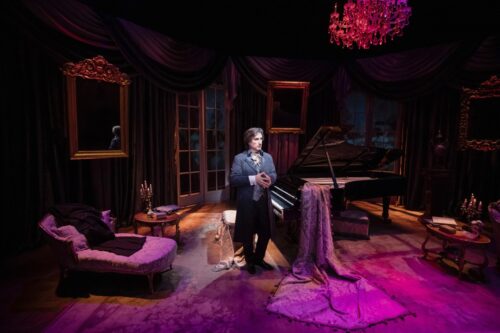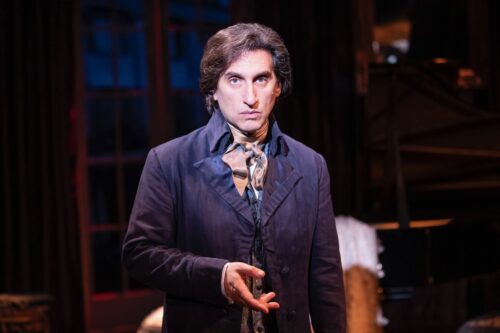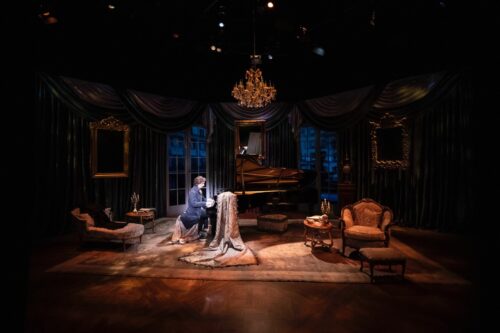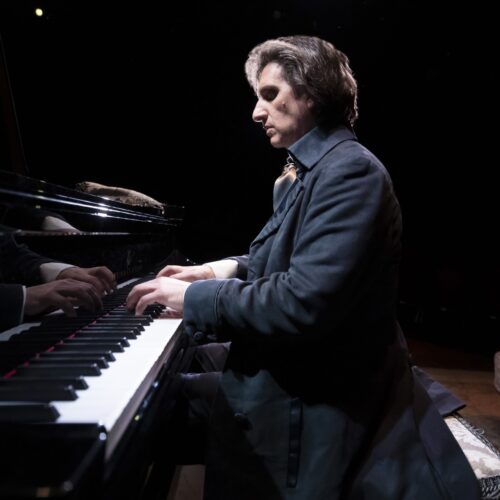CLASS ACT
Nestled comfortably inside the Wallis Annenberg Center for the Performing Arts in Beverly Hills, Hershey Felder: Chopin in Paris is an enchanting “play with music” on the life of the renowned pianist and composer, Fryderyk Chopin. In the title role of this one-man show is Hershey Felder. Known for his biographical works on the lives of musical greats from Beethoven, Liszt, and Tchaikovsky through Berlin, Gershwin, and Bernstein, Felder has captivated audiences for over 28 years and 6,000 live performances across America and abroad. Combining his refined piano-playing skills with a deep historical knowledge of famed composers and musicians, Felder is a singular virtuoso who both writes and performs his solo shows. A scholar-in-residence at Harvard University’s Department of Music, he is a delightful storyteller and captivating performer. It’s hard to imagine others, even an understudy, being able to fill his shoes, for how many people have these particular interests and skill sets? He’s clearly found his niche and made a successful career in bringing it to life. To witness him doing what he loves, and does so very well, is an absolute joy.
Directed by Joel Zwick, Chopin in Paris is instantly inviting. Upon entering the intimate Lovelace Studio Theater at The Wallis, audiences are treated to a peek inside the Polish composer’s cozy Parisian home. The set is designed by Felder himself (his aestheticism runs rampant), and is dimly, gorgeously lit by Erik S. Barry. There are throws and candles scattered throughout the room, a chaise lounge off to the side, and chandeliers above the stage and theater seats. Lining the back walls are purple velvet curtains interspersed with giant, gold-framed mirrors. High windows allow space for Erik Carstensen’s changing projections to augment the narrative throughout the show. The mood is relaxed but anticipatory. A Steinway & Sons concert grand piano is illuminated center stage.
It is 4 March, 1848 at 9 Square d’Orléans, Paris: the Romantic era; a time of revolution. We, the audience, are here for a lesson with our teacher, Fryderyk (a.k.a. Frédéric) Chopin. During his brief life of 39 years, the musician made a living selling his compositions and giving piano lessons. As we learn in the show, he performed only 30 public concerts in his lifetime. Instead of seeking fame, he preferred the artistic respect from fellow artists, and spent more time in intimate salon settings, including his own, where this play takes place. When Felder enters as the musical prodigy, he is smartly dressed in a formal, period suit. He explains that he is here to teach us. Everything he’s about to say, Felder informs us, was said by Chopin at some point in his lifetime. We’re not just here to learn about Chopin, though. We’re here to learn about art, storytelling, and the making of musical poetry that sings the truths of the soul.
I often found myself tearing up while listening to Felder play Chopin’s music. There’s something about the entire created atmosphere that made me shut out the world and focus. With delicate quietude, Felder guides the audience to not just listen, but truly hear. Watching “Chopin’s” fingers glide across the keys, only to interrupt such tenderness with strong, percussive jabs, is intoxicating. But what makes Chopin in Paris flourish is how Felder mines the composer’s pieces for story, giving each work clear context. Through careful listening, we can hear Chopin’s biographical, emotional details pouring through. Sometimes Felder, as Chopin, talks before, or after, a piece. Other times he discusses what we’re hearing as he’s playing it. I have no idea if the stories Felder is telling us about these works are true. Did Chopin actually think these exact, or similar, thoughts while composing? Who knows. And what does it matter? Whether in the passages of a mazurka, polainaise, or sonata, Felder explains what’s happening in, and through, Chopin. Whether it’s while observing the scene around him, or articulating a dark (then suddenly bright!) memory lodged in his psyche, every note is precisely the note that needs to be played, in precisely the way it needs to be played. We understand. We fall in.
Just as astounding is Felder’s knowledge. Throughout the show, Chopin asks his “class” for questions. We oblige. At first, I wasn’t sure if the inquiries were pre-arranged and given to “plants” in the audience. But then my friend asked Chopin which compositions were his most challenging. In flowery, articulate language as only Chopin (we imagine) would speak, the composer described the torture of attempting to recreate his improvisations. It was clear then that this Q&A was similarly impromptu. Because of these freewheeling sections wherein Felder fields an array of questions with grace and ease, each performance of Chopin in Paris is unique. (As if the evening weren’t lovely enough ’¦)
As Felder shares the composer’s journey from Poland to Paris, there’s a twinkle in his eyes. We’re even greeted with a sly smile at the top of the show. Yes, we’re here to be moved and informed, these looks show us, but we’re also in for a treat. Throughout the show’s 90 (or so) minute running time, Felder embodies his main and tertiary characters fully, and often with a wink. I can’t imagine doing the thousands of shows that he has without also ensuring a great time for himself and his audiences. Felder, dear student, certainly knows how to teach. But he also, in many ways, knows how to play.
Chopin in Paris
Wallis Annenberg Center for the Performing Arts
9390 N. Santa Monica Blvd. in Beverly Hills
ends on July 24, 2022
for tickets, call (310) 246.3800 or visit www.thewallis.org





